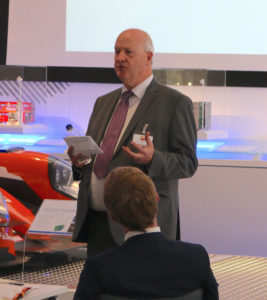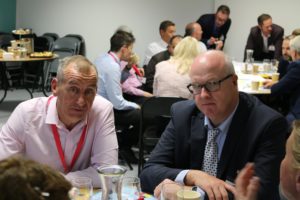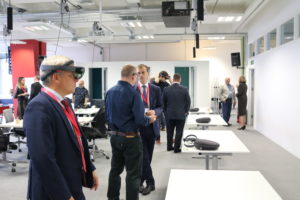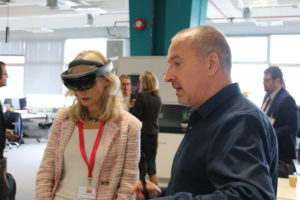Increasing job numbers and improving skills must be central to driving forward growth, according to the chairman of the Greater Brighton Economic Board (GBEB).
Speaking six months after he took up the role, Councillor Andy Smith said the body, which was founded in 2011 and made up of local authorities, business leaders and academia, have made a good start to improving the economy across the region.
With Gatwick Airport and Crawley Borough Council, Cllr Smith believes the Greater Brighton city region, which stretches from Worthing to Seaford, Crawley to Brighton, is well placed to keep on growing – despite the ongoing uncertainty created by Brexit.
But, he believes that GBEB must keep on leading the way, working together to improve the economy through jobs and skills; while also placing an emphasis on creating housing and improving infrastructure.
Cllr Smith, who is also leader of Lewes District Council, said: “One thing that is central to everything – wherever you live, however old you are, whatever you do and whatever political party you voted for – is that the growth of regional economy will have a positive impact on your life.
“With Brexit around the corner, we need to focus our energy on making sure the area is as resilient as possible. This means making sure we have companies that are good at making things, and selling them. Services, innovation and technology are also key but this must be about creating jobs in our region.”
Since being formed, the Greater Brighton Economic Board has helped bring tens of millions of pounds worth of funding into the area, which will help unlock projects worth more than £1 billion while creating thousands of jobs.
But Cllr Smith said he does not think residents are ready to use the term Greater Brighton just yet.
He said: “The issue will always be I suspect, summed up in the Life of Brian’s sketch dealing with “What have the Romans ever done for us Reg?…apart from the sanitation, the medicine, education, wine, public order, irrigation, fresh water system….”
“For our residents, the Greater Brighton Economic Board and all its partners work behind the scenes in the interests of all to achieve greater prosperity in the region.
“For those residents who want to to know more the partnership does need to unclutter its message and make it simple.”
To read the full Q&A, see below:
Q&A with Councillor Andy Smith, chairman of the Greater Brighton Economic Board
 Six months ago, Councillor Andy Smith, leader of Lewes District Council, took on the chairmanship of the Greater Brighton Economic Board (GBEB). The body, which is made up of local authorities, business leaders and academia, has one aim: boosting prosperity across an area covering close to one million people and more than 35,000 businesses. Half way through his year-long chairmanship, Cllr Smith mapped out what he hopes to achieve in the role.
Six months ago, Councillor Andy Smith, leader of Lewes District Council, took on the chairmanship of the Greater Brighton Economic Board (GBEB). The body, which is made up of local authorities, business leaders and academia, has one aim: boosting prosperity across an area covering close to one million people and more than 35,000 businesses. Half way through his year-long chairmanship, Cllr Smith mapped out what he hopes to achieve in the role.
You’ve been chairman of GBEB, what have your three top priorities for the coming year been?
The Greater Brighton Economic Board covers a vast area from Worthing in the west across to Seaford and north to Crawley. Within that area there are nearly a million residents living in hundreds of towns and villages, all of whom have their own unique take on what could be done to improve things in their area.
But one thing that is central to everything – wherever you live, however old you are, whatever you do and whatever political party you voted for – is that the growth of regional economy will have a positive impact on your life.
With Brexit around the corner, we need to focus our energy on making sure the area is as resilient as possible. This means making sure we have companies that are good at making things, and selling them. Services, innovation and technology are also key but this must be about creating jobs in our region.
We can only have growth though if we provide the skills businesses need, and that’s why the work of our two amazing universities and further education colleges in equipping future generations with these skills, as well as providing the opportunity of re and up-skilling is essential.
That’s why improving the Greater Brighton economy by focussing on jobs and skills is my number one aim.
The second area of focus is the provision of affordable housing in the region. Being a collection of planning authorities we are all doing our bit with developers big and small to provide new housing across the region.
 Thirdly, more can be done without a doubt if we start the conversation about our creaking infrastructure – those things which connect our places of work and business with our residences in our villages, towns and city.
Thirdly, more can be done without a doubt if we start the conversation about our creaking infrastructure – those things which connect our places of work and business with our residences in our villages, towns and city.
It is the obvious things such as transport with road and rail networks running over their design capacity at peak times.
The A27 and A259 are clear examples where starting these longer term conversation around the regions needs going forward will be a priority. Rail links particularly to London need to be improved. Infrastructure also includes the provision of digital fibre connectivity, utilities, school places for our children as well as health provision keeping pace.
It is a big piece of work, but essential to the plan to grow our region.
Why should people care about GBEB?
People are not going to care about something if they do not know about it, so we have taken steps in the last few months to try and spread the word about Greater Brighton.
We need to be clear on what our message is going forward .
 So, we are taking steps to tell people that it’s about a commitment to improving our economy; that means that local authorities and business partners embrace and support the notion of providing more skilled employment, housing and improving infrastructure.
So, we are taking steps to tell people that it’s about a commitment to improving our economy; that means that local authorities and business partners embrace and support the notion of providing more skilled employment, housing and improving infrastructure.
We have already had some wins where that work is coming through, such as the Adur Tidal Walls scheme in Shoreham; the Advanced Engineering Centre at the University of Brighton; and the Newhaven Enterprise Zone. All of these projects and more are receiving significant inward investment from the government.
The collaborative working of this group and its continuing efforts to work more closely with central government as well as business and educational partners is a strong and encouraging sign that it aims to succeed.
Given the range of bodies involved, how do you plan to keep unity of purpose?
 You’re right, this is not always easy and I think that similar bodies across the UK have the same issue.
You’re right, this is not always easy and I think that similar bodies across the UK have the same issue.
For instance, in the West Midlands, the population have elected a Conservative city mayor who is working with a majority of Labour council leaders.
The reality is politics does not come into the equation. All leaders and business partners work closely together because we share common aims and aspirations for our economic region.
So keeping unity of purpose in these large regional economic collaborations is not the problem that you might think it is.
Give us one blue-sky idea that you think GBEB can look into it?
 Personally, from a local authority perspective, my view is that more work could be done to scope what the region wants in the next five to 25 years.
Personally, from a local authority perspective, my view is that more work could be done to scope what the region wants in the next five to 25 years.
It needs to start to prioritise which areas will be becoming new and emerging centres of employment and skills; those areas which will be delivering the housing numbers; and what our infrastructure needs will be over time.
As an example, in my area of Lewes district, the designation of an Enterprise Zone in Newhaven demonstrates how this plan could work better.
A bid to create a satellite employment centre to Brighton City was successful and infrastructure funding the flood defences and link road.
I am confident we will deliver the 55,000 m2 of new commercial space and at least 2,000 new jobs in the next 25 years.
 The issue is this and the associated housing being delivered is exposing the lack of future proofing the road network, particularly the A259 coast road.
The issue is this and the associated housing being delivered is exposing the lack of future proofing the road network, particularly the A259 coast road.
Similar examples of how better forward planning could be helpful exist in the Greater Brighton Region and in terms of blue sky thinking planning for future economic growth in terms of infrastructure needs would be an essential contribution to the success of the region.
Do you think residents in the City Region are ready to use the term Greater Brighton?
I’m not sure if people are yet. I have lived in the past in Hove, Haywards Heath and Burgess Hill and now live on the coast at Telscombe Cliffs, so I realise the challenges that we all face in embracing this concept.
The issue for me has been ‘messaging’ and I am pleased that work is going on to ensure that we as a board understand how we can sell the region’s identity – having a common set of aims, a common language, understanding the contributing parts of building the environment for growth in our region and establishing funded work streams all help to make the concept easier to understand.
 The issue will always be I suspect, summed up in the Life of Brian’s sketch dealing with “What have the Romans ever done for us Reg?…apart from the sanitation, the medicine, education, wine, public order, irrigation, fresh water system….”
The issue will always be I suspect, summed up in the Life of Brian’s sketch dealing with “What have the Romans ever done for us Reg?…apart from the sanitation, the medicine, education, wine, public order, irrigation, fresh water system….”
For our residents, the Greater Brighton Economic Board and all its partners work behind the scenes in the interests of all to achieve greater prosperity in the region.
For those residents who want to to know more the partnership does need to unclutter its message and make it simple.
How can GBEB and its regional identity compare to the bigger and much powerful Northern Powerhouse and Midlands Engine?
Well it is true that we do look small compared to both of those areas.
We are about a tenth of the size of the Midlands Engine but I am drawn to this model in particular because it shows us how in a number of areas we could improve our chances of getting government buy in.
 In the world of ‘offers’ and ‘asks’ when dealing with central government, large and accountable bodies are preferable to them.
In the world of ‘offers’ and ‘asks’ when dealing with central government, large and accountable bodies are preferable to them.
Whitehall still favours the idea of elected city mayors in the wider devolution context. The West Midlands election for Mayor last year gave support to the growing faith and belief in the plan to regenerate the Midlands.
Getting the messaging right for them brought a valuable commitment from government of hundreds of millions of pounds of direct investments.
They also have become the focus of HS2 a multibillion pound infrastructure investment project.
The Government’s Industrial Strategy consultation illustrated that our region shares the same aims as them and as this important government policy emerges we aim to have positioned ourselves to be broadly aligned to this new strategy.
We are getting there, but there’s still work to do.
